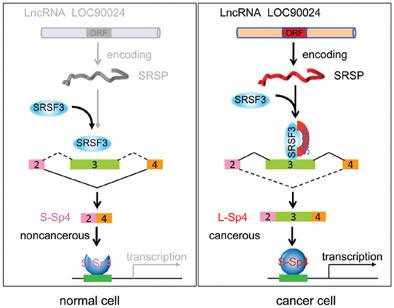Our official English website, www.x-mol.net, welcomes your
feedback! (Note: you will need to create a separate account there.)
Small Protein Hidden in lncRNA LOC90024 Promotes "Cancerous" RNA Splicing and Tumorigenesis.
Advanced Science ( IF 14.3 ) Pub Date : 2020-03-11 , DOI: 10.1002/advs.201903233 Nan Meng 1 , Min Chen 1 , De Chen 1 , Xin-Hui Chen 1 , Ji-Zhong Wang 1 , Song Zhu 1 , Yu-Tian He 1 , Xiao-Lan Zhang 1, 2 , Rui-Xun Lu 1 , Guang-Rong Yan 1, 2
Advanced Science ( IF 14.3 ) Pub Date : 2020-03-11 , DOI: 10.1002/advs.201903233 Nan Meng 1 , Min Chen 1 , De Chen 1 , Xin-Hui Chen 1 , Ji-Zhong Wang 1 , Song Zhu 1 , Yu-Tian He 1 , Xiao-Lan Zhang 1, 2 , Rui-Xun Lu 1 , Guang-Rong Yan 1, 2
Affiliation

|
Conventional therapies for late-stage colorectal cancer (CRC) have limited effects because of chemoresistance, recurrence, and metastasis. The "hidden" proteins/peptides encoded by long noncoding RNAs (lncRNAs) may be a novel resource bank for therapeutic options for patients with cancer. Here, lncRNA LOC90024 is discovered to encode a small 130-amino acid protein that interacts with several splicing regulators, such as serine- and arginine-rich splicing factor 3 (SRSF3), to regulate mRNA splicing, and the protein thus is named "Splicing Regulatory Small Protein" (SRSP). SRSP, but not LOC90024 lncRNA itself, promotes CRC tumorigenesis and progression, while silencing of SRSP suppresses CRC tumorigenesis. Mechanistically, SRSP increases the binding of SRSF3 to exon 3 of transcription factor Sp4, resulting in the inclusion of Sp4 exon 3 to induce the formation of the "cancerous" long Sp4 isoform (L-Sp4 protein) and inhibit the formation of the "noncancerous" short Sp4 isoform (S-Sp4 peptide), which lacks the transactivation domain. The upregulated SRSP level is positively associated with malignant phenotypes and poor prognosis in patients with CRC. Collectively, the findings uncover that a lncRNA-encoded small protein SRSP induces "cancerous" Sp4 splicing variant formation and may be a potential prognostic biomarker and therapeutic target for patients with CRC.
中文翻译:

隐藏在 lncRNA LOC90024 中的小蛋白促进“癌性”RNA 剪接和肿瘤发生。
由于化疗耐药、复发和转移,传统疗法治疗晚期结直肠癌(CRC)的效果有限。由长非编码RNA(lncRNA)编码的“隐藏”蛋白质/肽可能是癌症患者治疗选择的新资源库。在这里,lncRNA LOC90024被发现编码一个130个氨基酸的小蛋白,该蛋白与多个剪接调节因子相互作用,例如富含丝氨酸和精氨酸的剪接因子3(SRSF3),以调节mRNA剪接,因此该蛋白被命名为“Splicing”监管小蛋白”(SRSP)。 SRSP(而非 LOC90024 lncRNA 本身)促进 CRC 肿瘤发生和进展,而 SRSP 沉默则抑制 CRC 肿瘤发生。从机制上讲,SRSP 增加 SRSF3 与转录因子 Sp4 外显子 3 的结合,导致 Sp4 外显子 3 包含在内,诱导“癌性”长 Sp4 亚型(L-Sp4 蛋白)的形成,并抑制“非癌性”长 Sp4 亚型的形成。 “短 Sp4 异构体(S-Sp4 肽),缺乏反式激活结构域。 SRSP水平上调与CRC患者的恶性表型和不良预后呈正相关。总的来说,研究结果表明,lncRNA 编码的小蛋白 SRSP 会诱导“癌性”Sp4 剪接变体的形成,并可能成为 CRC 患者的潜在预后生物标志物和治疗靶点。
更新日期:2020-03-11
中文翻译:

隐藏在 lncRNA LOC90024 中的小蛋白促进“癌性”RNA 剪接和肿瘤发生。
由于化疗耐药、复发和转移,传统疗法治疗晚期结直肠癌(CRC)的效果有限。由长非编码RNA(lncRNA)编码的“隐藏”蛋白质/肽可能是癌症患者治疗选择的新资源库。在这里,lncRNA LOC90024被发现编码一个130个氨基酸的小蛋白,该蛋白与多个剪接调节因子相互作用,例如富含丝氨酸和精氨酸的剪接因子3(SRSF3),以调节mRNA剪接,因此该蛋白被命名为“Splicing”监管小蛋白”(SRSP)。 SRSP(而非 LOC90024 lncRNA 本身)促进 CRC 肿瘤发生和进展,而 SRSP 沉默则抑制 CRC 肿瘤发生。从机制上讲,SRSP 增加 SRSF3 与转录因子 Sp4 外显子 3 的结合,导致 Sp4 外显子 3 包含在内,诱导“癌性”长 Sp4 亚型(L-Sp4 蛋白)的形成,并抑制“非癌性”长 Sp4 亚型的形成。 “短 Sp4 异构体(S-Sp4 肽),缺乏反式激活结构域。 SRSP水平上调与CRC患者的恶性表型和不良预后呈正相关。总的来说,研究结果表明,lncRNA 编码的小蛋白 SRSP 会诱导“癌性”Sp4 剪接变体的形成,并可能成为 CRC 患者的潜在预后生物标志物和治疗靶点。











































 京公网安备 11010802027423号
京公网安备 11010802027423号